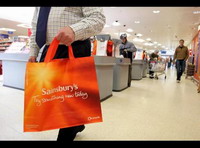Qatari investment group offers definitive bid to J Sainsbury PLC
A Qatari investment group offered definitive 10.6 billion pound (15.3 billion EUR; US$22.1 billion) bid to J Sainsbury PLC because of turmoil in the credit markets.

Sainsbury shares plunged nearly 21 percent, knocking about 2 billion pounds (2.9 billion EUR; US$4.2 billion) off its market value.
Delta Two, an investment vehicle backed by the Qatari Investment Authority, said the cost of borrowing had risen significantly since it first made its 600 pence (8.64 EUR; US$12.54) per share approach, and the deal was no longer viable.
"Having given careful consideration to the additional funding requirement and its impact on prospective investment returns, Delta Two has regretfully concluded that a recommendation to proceed with the proposed transaction would not be in the best interests of stakeholders," said Paul Taylor, principal of Three Delta LLP, the strategic investment adviser for the bid.
Sainsbury had been receptive to the bid, after seeing off earlier takeover attempts by other suitors. Its shares fell 20.7 percent to close at 440 pence (6.33 EUR; US$9.19) on the London Stock Exchange.
The Qataris, who had built up a 25 percent stake, disclosed last month that they were seeking 500 million pounds (720 million EUR; US$1 billion) of additional equity to bolster its offer for Britain's third-largest grocer.
Both sides agreed last week to set a Nov. 8 deadline for Delta Two to "put up or shut up." The investment group is now barred from making a further bid for Sainsbury for six months.
"Since Delta Two's original proposal was submitted to the board of Sainsbury, the required funding and cost of capital has increased significantly, which has adversely affected the investment case," Delta Two said in an announcement to the London Stock Exchange.
"This reflected a combination of factors including the deterioration of credit markets, which impacted the terms of lending and other facilities available to Delta Two following the initial approach to the Sainsbury Board and the arrangements for the future funding of the Sainsbury pension schemes necessary to gain the backing of the Sainsbury pension trustees."
Sam Hart, analyst with Charles Stanley & Co. in London, said that Delta Two's 25 percent stake plus the 10 percent held by entrepreneur Robert Tchenguiz would probably discourage any other bidders.
"What Delta decides to do with its 25 percent stake in Sainsbury is critical," Hart said.
The Qataris may continue as an activist shareholder, but "the possibility of Delta returning with another bid after six months cannot be ruled out, particularly if more favorable conditions in credit markets lead to lower funding costs."
Unite, a union which represents 20,000 Sainsbury employees, said it hoped the collapse of the Delta Two bid would usher in a period of stability for the company.
"But we are aware that significant Sainsbury's shareholders have designs on splitting the company's retail and property interests," said Brian Revell, Unite national organizer for food and agriculture. "Such a split would not be good news in our judgment and we would urge the board to resist the temptation."
Sainsbury's management expressed confidence in the future of the business.
"Interest in Sainsbury's has been borne out of the company's success to date in implementing its recovery strategy," said Chief Executive Justin King.
"All colleagues can now continue to deliver towards the targets we have set," he said.
Sainsbury, Britain's biggest grocer just over a decade ago, has fallen down the rankings amid stiff price competition from market leader Tesco PLC and No. 2 Asda Group Ltd., which is owned by U.S. retailer Wal-Mart Stores Inc.
The company is just over halfway through a three-year recovery program begun by King, who was recruited from Marks & Spencer Group PLC in 2004 for the task. King has slashed jobs, cut a quarter of Sainsbury's headquarters positions, shut underperforming stores and improved the supply and distribution chain.
In February, a private equity consortium comprising CVC Capital Partners, Kohlberg Kravis Roberts & Co. Ltd. and Blackstone Group International Ltd. expressed interest in the grocer. That deal fell apart after it was rejected by Sainsbury, and Delta Two steadily built up its stake to 25 percent before revealing in July that it was in preliminary talks about a deal.
Subscribe to Pravda.Ru Telegram channel, Facebook, RSS!


